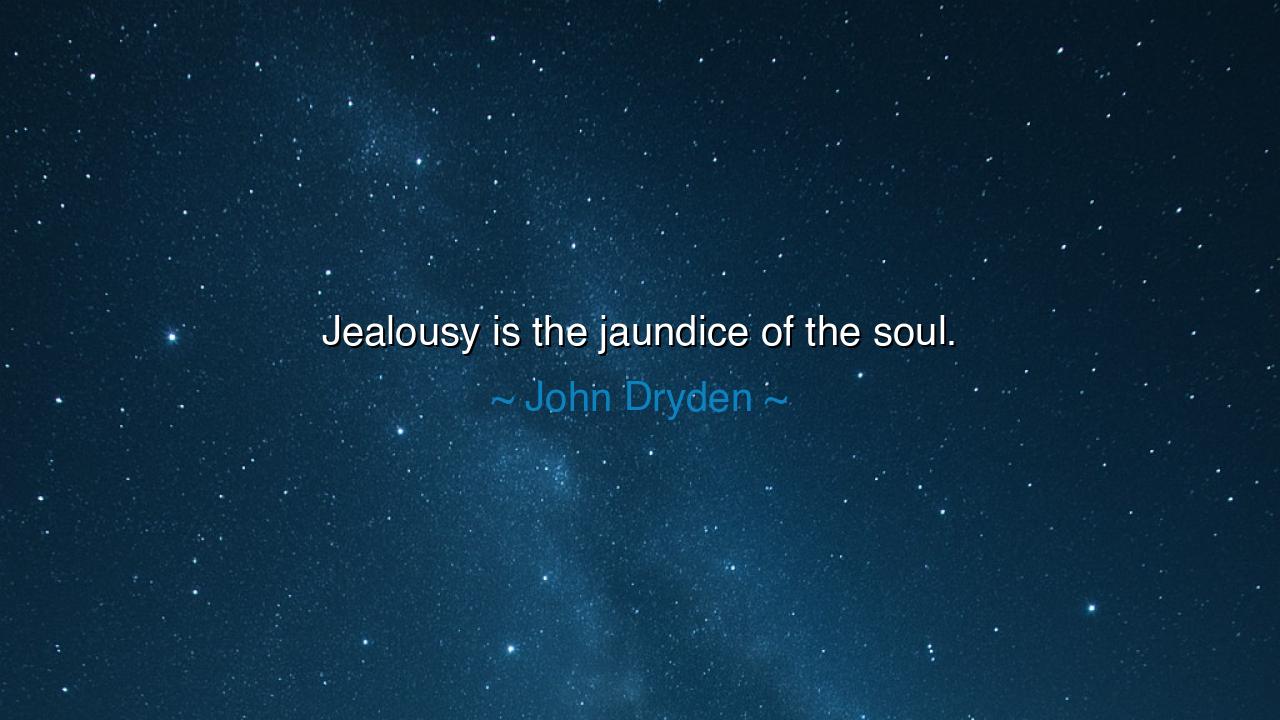
Jealousy is the jaundice of the soul.






Listen well, children of insight, and attend to the words of John Dryden, a voice attuned to the inner workings of the human heart: “Jealousy is the jaundice of the soul.” Let these words settle upon your spirit, for they reveal a truth both stark and enduring. Just as jaundice turns the body sickly and yellow, corrupting its natural vigor, so too does jealousy afflict the soul, tinting perception, warping judgment, and staining the light of reason and virtue with bitterness and envy.
Jealousy is not merely a fleeting emotion; it is a corrosive malady, one that seeps into thought and deed, transforming the heart into a shadowed place. Where clarity once resided, suspicion takes root; where trust once flourished, bitterness grows. Like a sickness that spreads silently through the body, jealousy spreads through the mind, turning friendships into rivalries, love into possessiveness, and admiration into disdain. The soul, once radiant, becomes clouded, and even the sweetest joys taste of the gall of envy.
History offers many mirrors to this truth. Consider the tale of King Saul of Israel and the young David. Saul, consumed by jealousy of David’s growing favor and prowess, allowed his envy to fester. It clouded his judgment, led him to persecute an innocent man, and ultimately fractured his kingdom. The king’s soul, infected with the jaundice of envy, became sickly and ungoverned, showing that the malady Dryden spoke of is as perilous as any disease that strikes the body, yet far more insidious.
Even in more recent times, one may observe the corrosive effects of jealousy among rulers, leaders, and families. The conflict between the Kennedy brothers, though often a source of admiration for their ambition, sometimes revealed shades of envy that complicated trust and unity. Ambition, when mingled with jealousy, can twist the noblest pursuits into rivalry and resentment, demonstrating that the jaundice of the soul knows no era, no rank, and no immunity.
The danger of jealousy lies not merely in its presence, but in its persistence. Left unchecked, it blinds the mind and hardens the heart. It transforms perception, turning blessings into threats, joy into bitterness, and love into suspicion. Unlike physical illness, its damage is silent and gradual, often unnoticed until relationships are fractured and peace is lost. Dryden’s metaphor warns that, like the body stricken with jaundice, a soul consumed by envy becomes a vessel of decay, radiating sickness into every corner of life.
Yet, the ancients also taught that all maladies, whether of body or soul, can be countered with vigilance and care. To resist jealousy, one must cultivate gratitude, self-awareness, and the ability to celebrate the success and joy of others. Meditate upon your own strengths, nurture confidence in your abilities, and focus on the growth of your own life rather than the possessions or achievements of another. In doing so, one purges the soul of envy’s jaundice and restores clarity, health, and serenity.
Practical guidance emerges from this reflection: when jealousy arises, name it, examine its source, and consciously redirect attention to constructive thought and action. Foster empathy, communicate openly with those around you, and engage in acts of generosity and kindness. Let the achievements of others inspire rather than wound; let their joys illuminate possibilities rather than provoke resentment. In this way, the soul, once tainted, may regain its natural radiance, and life flows with harmony rather than bitterness.
Therefore, generations to come, remember Dryden’s warning: jealousy is not a mere fleeting passion, but a sickness of the spirit. Guard your heart, cultivate trust and gratitude, and release the corrosive shadows of envy. In doing so, you preserve the clarity, joy, and nobility of the soul, ensuring that life is not dimmed by the jaundice of bitterness but brightened by virtue, compassion, and serene understanding.
If you wish, I can also craft a more poetic and mythic version, portraying jealousy as a literal shadow that leaches color and light from the soul, for a version suited to dramatic or meditative narration. Do you want me to do that?






AAdministratorAdministrator
Welcome, honored guests. Please leave a comment, we will respond soon